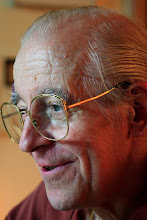Though the two mourning altars were dedicated to the same person, the atmosphere around each is very different. The mourning altar prepared by the government at the Seoul Museum of History in Kyonghui Palace is calm and formal. In contrast, the one set up by the public at the Taehan Gate of Toksu Palace is noisy and crowded. The line of mourners gets longer at night, reaching around the palace’s outer walls and stretching even farther. You can find many things at Toksu Palace that you cannot see at Kyonghui Palace. The most notable differences are candlelight and trees and walls covered with yellow ribbons and messages of condolences.

Lines of mourners carrying candles wind along the walls of Toksu Palace

Mourners covered police buses that barricaded Toksu Palace, with notes of remembrance
Obviously, the visitors to both altars share feelings of grief at the loss of former President Roh Moo-hyun (1946-2009). However, the contrasts in atmosphere seem to illustrate different perspectives on the death. The altar at Kyonghui Palace features only the formality and procedure of a national funeral. One feels that expressing anything but condolences over the death should be left aside. Meanwhile, the altar at Toksu Palace is liberating. It is filled with all kinds of sounds and cries. Of course, most come in grief. But you can also hear cries of hatred. Some are holding the actual President Lee Myung-bak responsible. Some warn that he will pay in three and a half years, while others curse and call him a murderer. A table is set up next to the mourning altar to collect signatures calling for the impeachment of President Lee. After offering incense to the late president, people move on to this table.
Talk of political retribution is widespread. Han He-jong, one of Roh’s closest aides, called his death “political murder.” Democratic Party leader Chong Se-gyun claimed that someone is responsible for the death. The unusually long and extensive investigation by prosecutors caused extreme psychological pressure on the former president, they assert. Some say the current administration intended political retaliation against the previous administration through the prosecutors.
Is President Lee Myung-bak indeed responsible for the death of former President Roh Moo-hyun?
There are strong counter-arguments against this accusation. Young conservative commentator Pyon Hui-jae called Roh a gangster boss who sacrificed himself to save those around him. He insisted that not a penny of taxpayers’ money should be used on the funeral. Chi Man-won expressed unreserved animosity, saying, “I cannot stand the Nosamo group of Roh supporters wielding influence with a dead body”. After all, they argue, the death of Roh Moo-hyun was caused by Roh himself or those close to him who were involved in the corruption scandal.
It is hard to condemn the departed in the heated atmosphere of mourning. While these critics are very few, more people seem to quietly agree. Both sides are keenly sensitive in the confrontation over the shocking death of the former president. But their recriminations do not leave room for progress. Both claims have some truth behind them.
The prime culprit in Roh’s death is the presidency itself. The origin of the tragedy is the presidential system that is imperialistic and concentrates excessive power to the chief executive. Let me assume that the late president was really unaware of the money transactions. However, his brother and wife could receive and borrow several hundred million won because of the power of the president. Because the late president had excessive power, his friends and family members possessed considerable influence.
The Nonghyop Agricultural Cooperative sold a lucrative business to Park Yon-cha, chairman of Taekwang Industrial, because of the influence of the president’s brother. Many people believe the accusations of political retaliation because the president has the power to pressure prosecutors politically.
Korea’s presidential system is deformed. The checks and balances, the basic principle that makes the presidential system operate democratically, are not properly functioning. The founding fathers of the United States were concerned about the president growing too powerful when they established the presidential system and created all kinds of devices to have the legislative and judiciary branches balance presidential power. Unchecked power can be abused, but power can be kept in check, not by an individual, but by another power. When Koreans imported the presidential system, they neglected to import such a spirit. As a result, presidents were able to wield absolute power and could not escape the fate of corruption. It is desirable the death of the former president will be the end of this tragic karma.
Giorgio Olivotto
Seoul, Korea
Photos by Chong Myo-hwa
4 June 2009
Seoul, Korea
Photos by Chong Myo-hwa
4 June 2009
